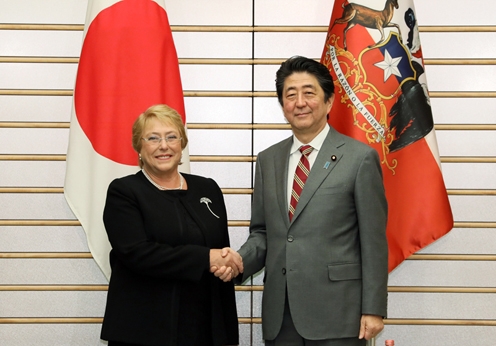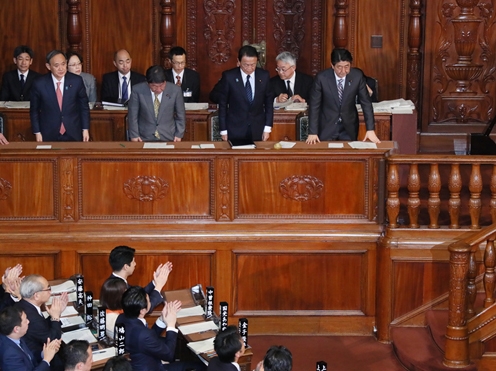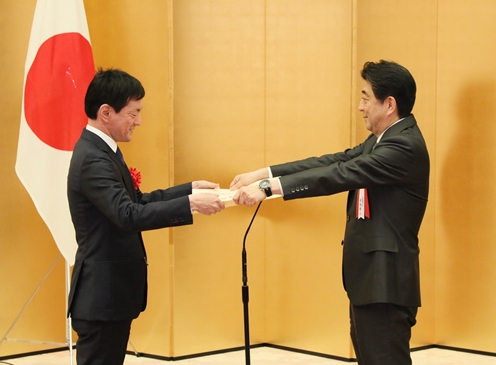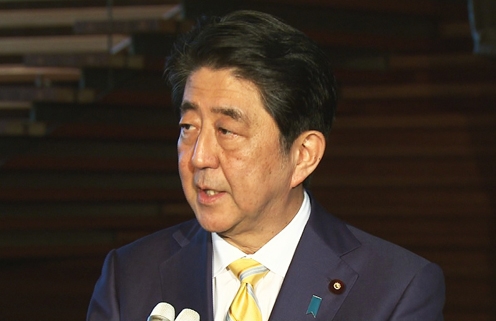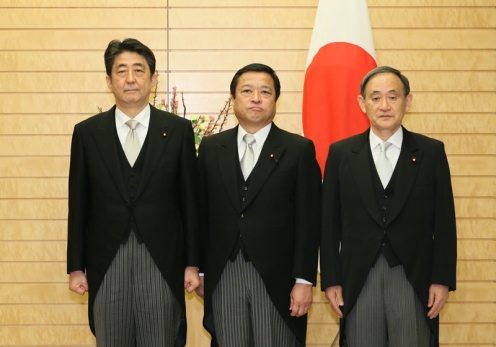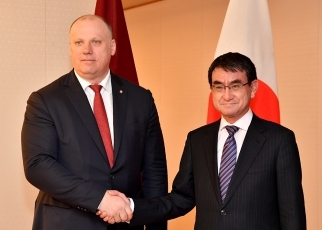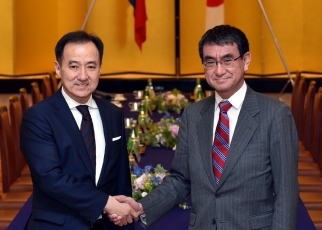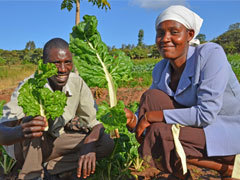Japan-Chile Summit Meeting and Other Events
Cabinet Secretariat, Friday, February 23, 2018
[Provisional Translation]
On February 23, 2018, Prime Minister Shinzo Abe hosted a summit meeting and other events with H.E. Ms. Michelle Bachelet Jeria, President of the Republic of Chile, at the Prime Minister’s Office.
The two leaders attended a salute and guard of honor ceremony, followed by a summit meeting. Thereafter, the leaders held a signing ceremony and joint press announcement.
Lastly, the Prime Minister hosted a dinner banquet at the Prime Minister’s Official Residence and said in his address,
“I would like to once again offer my heartfelt welcome to President Bachelet on her visit to Japan. When I visited Chile four years ago, I was moved by the beauty of the snow-covered mountains of the Andes. I hope that President Bachelet will also enjoy Japan to the fullest during her visit.
Last year, Japan and Chile celebrated the 120th anniversary of diplomatic relations, and our bonds stretch beyond the Japanese Chilean community in Chile.
For instance, over half of the salmon imported to Japan is from Chile. Salmon is not indigenous to the country. I am happy to say that technical cooperation done by the Japan International Cooperation Agency (JICA) played no small part in contributing to salmon aquaculture development in Chile. I think that we can truly call this a win-win cooperation.
While I was in Chile, I had an opportunity to attend the opening ceremony for a new copper mine. Chile is now the world’s largest producer of copper and the largest supplier to Japan. If we were to trace back the materials used for the ten-yen coins we use every day, we may find that a considerable proportion of those materials come from Chile.
Among Japanese households, Chile is above all famous for its delicious wine. In 2015, Chile surpassed France and became No. 1 in terms of the number of wine bottles imported into Japan. I cannot say this in front of the President of France.
In these ways, our two countries have exchanges in a wide range of fields. We have invited leading figures across the country to today’s banquet, all of whom are supporting these kinds of wonderful cordial relations between our two countries in a variety of fields, including politics, the economy, and culture. I would like to take this opportunity to express my gratitude for your support, and request your continued engagement in the deepening of our bilateral relationship.
I would now like to give a toast to the good health of President Bachelet and everyone with us today, as well as the further development of our bilateral relations. Salud.”
Meeting of the Budget Committee, Meeting of the Financial Affairs Committee, and the Plenary Session of the House of Representatives
Cabinet Secretariat, Wednesday, February 28, 2018
[Provisional Translation]
On February 28, 2018, Prime Minister Shinzo Abe attended the meeting of the Budget Committee, the meeting of the Financial Affairs Committee, and the plenary session of the House of Representatives.
Awards Ceremony for the Fourth Japan Venture Grand Prize
Cabinet Secretariat, Monday, February 26, 2018
[Provisional Translation]
On February 26, 2018, Prime Minister Shinzo Abe attended the awards ceremony for the Fourth Japan Venture Grand Prize, held at the Prime Minister’s Office.
The Prime Minister said in his address,
“Congratulations to all of the winners on their awards at this Fourth Japan Venture Grand Prize. Taking this opportunity, I would like to commend your efforts and achievements.
Just a moment ago, I viewed the exhibits set up by each of the award winners. All of them looked quite exciting and made us envision the great change coming in the near future.
Even in politics, it is of the utmost importance that we create and implement policies that excite young people and make it possible for them to have dreams and hopes for their future. This is not just important for young people, as we enter an age of 100-year lifespans. The people gathered here today have shared with me some insights for thinking about what our jobs will look like and how our experiences and know-how, accumulated over the years while we are growing old and physically weak, can be applied to new fields as various technologies advance. In a sense, our work shares a similar aspect to start-ups, in that we must not forget the spirit of constantly pursuing new challenges. Standing before all of you now, I am reminded of this once again.
I have gone a little bit off track. Anyway, earlier, I tried out the free market app created by Mercari, one of the award winners this time. Using Mercari’s app, people can easily turn into money items that they no longer need and would otherwise throw away. It also gives consumers a cheap way of purchasing the things they want. Having proposed such a recycle-based consumption style, Mercari generates revenue through the collection of processing fees. Furthermore, this contributes to the tax revenue of the Government. I think it therefore benefits all parties.
We should not simply cut costs or imitate others, but expand our businesses by creating entirely new value. This way of doing business has traditionally been the forte of Japan, ever since the time of the Omi merchants (a famous group of merchants in Japanese history) to the present day. This is the royal road to success in business no matter where you are in the world. That is why Mercari has enjoyed success across many different countries, including Japan, the United States, and even the United Kingdom, and quickly gained over 100 million users around the world.
Big data, the Internet of Things (IoT), and artificial intelligence (AI). Thanks to these revolutionary innovations, we are now witnessing a historic change that is worthy of being called the fourth industrial revolution. There comes completely new value when we overcome existing technical limitations and connect people and even people with things. The possibility of the creation of such value is increasing rapidly. This revolution presents a major opportunity for the Japanese economy. We must not let it pass us by. We will take on the challenge of creating revolutionary business models by making active use of new innovations. Standing at the forefront of these efforts are none other than ambitious startups like yours. Even Toyota and Sony began as start-ups. Determined to provide new value to the world, they took on challenges after challenges to create cutting-edge innovations, thereby developing into world-class companies.
I hope that all of you will continue to boldly rise to new challenges and grow into companies that can drive the Japanese economy forward. The young people of the next generation are watching you. In closing my remarks I would like to express my high hopes for your continued success and development such that you inspire even stronger entrepreneurship among the next generation. I have high expectations for all of your future activities. Congratulations on your awards today.”
Press Occasion on the Resignation of Minister Esaki and Other Matters
Cabinet Secretariat, Tuesday, February 27, 2018
[Provisional Translation]
On February 27, 2018, Prime Minister Shinzo Abe held a press occasion at the Prime Minister’s Office.
“Today, I spoke on the telephone with Mr. Tetsuma Esaki, who is currently in hospital. He explained that, for the time being, he needs to receive in-hospital medical treatment and is unable to fulfil his responsibilities as a minister during the budget deliberations. He said that he therefore wishes to resign from his position. It is necessary for Mr. Esaki to stay in the hospital for some time and receive treatment, and I have decided to respect his wishes.
Currently, we are right in the midst of the budget deliberations. Determining that we must pass the budget as soon as possible and that we cannot afford even a single day’s delay, I have decided to ask Diet member Teru Fukui to succeed Mr. Esaki. Mr. Fukui has served as Deputy Chairman of the Policy Research Council of the Liberal Democratic Party and is a policy expert. Furthermore, Mr. Fukui has also served as Chairman of the Special Committee on Okinawa and Northern Problems of the House of Representatives. He is therefore well-versed in matters related to Okinawa and the Northern Territories and I believe he is the right person for strongly promoting the relevant measures. Working together with the newly-appointed Minister Fukui, I will do my utmost to respond to matters related to Okinawa and the Northern Territories, consumer affairs, and issues concerning territorial land and sea, among others.”
Giving a Letter of Assignment (Minister)
Cabinet Secretariat, Tuesday, February 27, 2018
[Provisional Translation]
On February 27, 2018, Prime Minister Shinzo Abe gave Minister of State Teru Fukui a letter of assignment as the new Minister of State for Special Missions (Okinawa and Northern Territories Affairs, Consumer Affairs and Food Safety, Ocean Policy) and Minister in charge of Territorial Issues.
Minister for Foreign Affairs Taro Kono Met with the Minister of Defence of Latvia
Foreign Affairs, Tuesday, February 27, 2018
On February 27, commencing at 2:30 p.m. for approximately 35 minutes, Mr. Taro Kono, Minister for Foreign Affairs, held a meeting with Mr. Raimonds Bergmanis, Minister of Defence of the Republic of Latvia. The overview of the meeting is as follows.
1. Opening Remarks
Minister Kono mentioned that Mr. Shinzo Abe, Prime Minister of Japan, visited Latvia in January this year for the first time as Prime Minister of Japan, and explained that he would like to promote Japan-Baltic cooperation including by utilizing the framework of the “Japan-Baltic Cooperation Dialogue” (Note), which has agreed by the leaders to establish during Prime Minister Abe’s visit. Minister Bergmanis replied that he felt honored to be able to visit Japan, mentioning that this year commemorates the 100th anniversary of Latvia’s independence, and expressed gratitude for the support that Japan has extended since the time of Latvia’s independence.
2. Regional affairs
(1) With regard to North Korea, Minister Kono explained that though North Korea participated in the PyeongChang Olympic Games, it is continuing with its nuclear and missile development programs, and he affirmed the necessity to adhere to the policy of maximizing pressure, including through the full implementation of the United Nations Security Council (UNSC) resolutions. In response, Minister Bergmanis stated that North Korea’s nuclear issue was not only a challenge to Japan alone, but also to entire international community, and Latvia was also keeping a close eye on the issue.
(2) In addition, the two ministers exchanged views on regional affairs, including Russia, Ukraine and the South China Sea.
(Note) The “Japan-Baltic Cooperation Dialogue”
A dialogue framework for promoting cooperation between Japan and the Baltic countries in a variety of fields in the future that Prime Minister Abe agreed to establish with the leaders of the three Baltic States when he visited the three countries in January this year for the first time as Prime Minister of Japan. (Participation from the public and private sectors is envisaged).
Japan-Mongolia Foreign Ministers’ Meeting
Foreign Affairs, Thursday, February 22, 2018
On February 22, commencing at 7 p.m. for approximately 150 minutes, Mr. Taro Kono, Minister for Foreign Affairs, held a meeting and a working dinner with H.E. Mr. Damdin Tsogtbaatar, Minister for Foreign Affairs of Mongolia, who is visiting Japan. The overview of the meeting is as follows.
1. Bilateral Relationship
At the outset, Minister Kono welcomed Minister Tsogtbaatar on his first visit to Japan since his appointment in October 2017, and expressed his desire to promote sports exchanges between Japan and Mongolia towards the 2020 Tokyo Olympic and Paralympic Games with Minister Tsogtbaatar, who is a judo enthusiast. In response, Minister Tsogtbaatar stated that Japan is a strategic partner that shares the universal values of democracy, human rights, and freedom and that the deepening of cooperation with Japan is a matter of the highest priority for Mongolia.
The two Ministers also agreed to continue efforts on both sides for the development of a truly mutually beneficial “Strategic Partnership” under the Japan-Mongolia Mid-term Action Plan for a Strategic Partnership (2017-2021) established in March 2017.
Minister Kono conveyed his hope that Mongolia’s fiscal discipline would be steadfastly secured, referring to the fiscal support under the International Monetary Fund (IMF) support program, and sought cooperation towards the earliest possible opening of the New Ulaanbaatar International Airport for use. In response, Minister Tsogtbaatar expressed gratitude for the assistance from Japan and stated that Mongolia would make further efforts to stabilize its economy.
The two Ministers also confirmed that they would work towards strengthening the bilateral economic relationship, including the improvement of the investment environment in Mongolia through the steady implementation of the Japan-Mongolia Economic Partnership Agreement (EPA).
2. North Korea
With regard to the nuclear and missile issues of North Korea, Minister Kono stated that it was important to place maximum pressure on North Korea through all means available, including the complete implementation of the United Nations Security Council resolutions. The two Ministers agreed to continue to cooperate closely regarding the response to the North Korea issues. In addition, Minister Kono sought the ongoing cooperation of Mongolia towards the early resolution of the abductions issue, and in response Minister Tsogtbaatar expressed his desire to continue to cooperate.
3. Regional and international situation
The two Ministers also exchanged views on regional and international situations and agreed to further deepen cooperation in each area.
Press Conference by Foreign Minister Taro Kono
Foreign Affairs, Friday, February 23, 2018
Opening Remarks
(1) Comments on the Comfort Women Issue by the ROK Delegate at the Committee on the Elimination of Discrimination against Women
Mr. Taro Kono, Minister for Foreign Affairs: Yesterday, the Committee on the Elimination of Discrimination against Women considered the periodic report of the Republic of Korea (ROK) during the session in Geneva, and the term “sex slaves” that contradicts the facts was used.
Japan cannot accept the use of terms such as “sex slaves,” mentioned by the ROK delegation yesterday, notwithstanding the fact that this point had been confirmed between Japan and the ROK when we reached the Japan-ROK agreement. This is extremely regrettable.
As explained in the Statement by the Press Secretary issued early this morning, the Government of Japan will strongly urge the ROK to steadily implement the agreement as a “final and irreversible” agreement.
(2) ICJ Special Election (Nomination of University of Tokyo Professor Yuji Iwasawa as Candidate)
Minister Kono: Mr. Hisashi Owada, a judge at the International Court of Justice (ICJ), submitted his resignation on February 6. The United Nations will be holding a special election to fill the position, and Japan has decided to recommend Professor Yuji Iwasawa at the University of Tokyo as a candidate.
Professor Iwasawa is an expert on international law who is highly appreciated internationally. He also has extensive practical experience. Japan believes he is the best choice as a candidate for an ICJ judge.
Japan, which attaches importance to the rule of law in the international community, believes it is important for a Japanese judge to continue contributing to the ICJ. Japan intends to put its utmost efforts toward the election of Professor Iwasawa as an ICJ judge.
(3) Release of the 2017 White Paper on Development Cooperation
Minister Kono: I reported on the release of the 2017 White Paper on Development Cooperation at the Cabinet Meeting today.
This White Paper contains features on “international cooperation for peace, stability, and prosperity in the international community” and “efforts to achieve the Sustainable Development Goals (SDGs).”
The Ministry hopes that this White Paper will help further deepen interest and understanding of Japan’s development cooperation among the Japanese people.
Committee on the Elimination of Discrimination against Women
Reporter: Regarding the matter involving discrimination against women mentioned at the outset, Foreign Minister Kang Kyung-wha of the ROK recently stated that the Japan-ROK agreement was a negotiation that forgot the true issue and is likely to make a similar statement at the next session of the United Nations Human Rights Committee. What are your thoughts about these developments, particularly such comments made at international fora, despite talking about the agreement being a promise made between the two countries?
Minister Kono: President Moon also commented on the agreement to Prime Minister Abe. Japan urges the ROK to fully recognize that this is a “final and irreversible” international promise and steadily implement it. Japan is implementing the agreement with sincerity and expects the ROK to do the same.
WTO Dispute Settlement Procedure
Reporter: Early this morning the World Trade Organization (WTO) reached a decision in Japan’s favor regarding the ROK’s restrictions on imports of Japanese fishery products. The ROK is dissatisfied and appealing this decision. Please explain your reaction to these developments.
Minister Kono: You need to ask the ROK Government about the ROK’s appeal. Japan, meanwhile, believes that its assertions were accepted and intends to request a prompt response by the ROK based on the decision.
Committee on the Elimination of Discrimination against Women
Reporter: The ROK delegation stated that it intends to support activities for the establishment of a comfort woman statue during the session of the Committee on the Elimination of Discrimination against Women. What is your view of this statement?
Minister Kono: Was this not a reference to a memorial? Let me check on it.
Reporter: What is your view of the memorial?
Minister Kono: Japan’s position is to urge the ROK to steadily implement the Japan-ROK agreement.
Contact Between the U.S. and North Korea at the PyeongChang Olympic Games
Reporter: There have been media reports about efforts to arrange contact between the U.S. and North Korea at the Olympic Games that fell through. Was the Japanese Government aware of this possibility ahead of time?
Minister Kono: There is absolutely no discord among Japan, the U.S, and the ROK in the response to North Korea.
JICA’s Ever-Expanding Support for Women’s Empowerment – Promoting Gender-Responsive Policing, Agriculture Empowerment and Financial Access
JICA, Thursday, March 1, 2018
With the aim of helping realize societies in which people can display their abilities regardless of their gender, JICA has been providing assistance for many years in various fields toward gender equality and the empowerment of women. It includes support for the protection of women who have experienced gender-based violence, promoting the role of women and their participation in decision making at home and in the community, as well as increasing women's financial access.
International Women's Day is observed every year on March 8. Women around the world are increasingly participating in society and taking leadership roles. Here is a look at JICA’s approaches that focus on the role of women in society.
Supporting the Training of Female Police Officers in Afghanistan
It is said that about 87 percent of women in Afghanistan experience gender-based violence including domestic violence, sexual assault, sexual harassment and forced marriage. Women currently constitute only about 4 percent of the country's national police force, and nurturing female police officers who can provide appropriate protection and support to women who have experienced violence is an issue.
The fourth such workshop was held in January this year with the participation of 243 female police officers, including new recruits. The participants increased their knowledge and skills relating to providing effective protection and support to women who have experienced violence. To date, about 1,000 female police officers — or about 30 percent of female Afghan police officers — have participated in this workshop.
Makiko Kubota, JICA Senior Advisor on Gender and Development, who served as a lecturer at the workshop, said, "Many female Afghan police officers have experienced violence themselves, such as domestic violence, sexual violence and child marriage. Many of them are joining the police force with a strong motivation to work for women’s peace and security, and particularly to help other women survivors of violence." She emphasized the importance of providing psychological support to heal the trauma of female police officers who have been victimized.
Kubota also emphasized the importance of working with more male police officers by facilitating more training for them on gender-based violence, sexual harassment and women’s rights issues.
Agricultural Revenue Can Be Increased If Married Couples Work Together — Changing Mindsets in Africa
Income can be increased if a married couple embraces the concept that they are partners in the management of their farm. This is the perspective being taken in JICA's SHEP (Smallholder Horticulture Empowerment and Promotion) approach, which is involved in gender equality and empowerment of women in agricultural communities in various African nations. SHEP promotes farming as a business, realizing a shift from "grow and sell" to "grow to sell." In addition to farming technique training, gender awareness training and domestic finance training are also important activities in the SHEP approach.
Farming households participate in the training as married couples. It changes the traditional perception of gender roles in which the husband is the one who takes care of money-related matters. Married couples learn how to manage domestic finances as well as how to prepare farming plans together. Through higher production efficiency and bigger earnings, the incomes of farming households that adopt SHEP have doubled as compared to before adoption.
SHEP was launched in 2006 in Kenya. Today, it has expanded to 23 countries in Africa. Extension staff, who are involved in farming technique and domestic finance training, number about 1,900. As of March 2017, 42,468 farmers had undergone training under SHEP. The approach is now also being implemented outside of Africa in Central America and Asia, including El Salvador and Nepal. There are expectations for the further expansion of SHEP going forward.
Contributing to Women's Empowerment Through Microfinance
JICA also provides support toward women's financial access. One example is its investment in the Japan ASEAN Women Empowerment Fund, which was established in 2016. This was the first time JICA made an investment in a fund for microfinance institutions that provide small financial services to poor and low-income populations with a focus on women's empowerment. In regard to this fund, JICA is encouraging the mobilization of funds from Japanese institutional investors by reducing the risk held by private investors.
This fund aims to contribute to the empowerment of women, and especially to the improvement of financial access for low-income women in the region through expanding financing to microfinance institutions focusing on the empowerment of women in Asia, particularly in ASEAN countries.
Outline of Health, Labour and Welfare Statistics 2017
MHLW, Thursday, March 1, 2018
Health, labour and welfare administration in Japan covers the wide range of the nation’s whole life from the birth to the elderly life.
Director-General for Statistics and Information Policy offers basic data in promoting policies which bring people“secure”and“vital” life by carrying out various statistics corresponding to the each stage of life cycle.
This booklet aims to illustrate the findings of the statistics carried out by our bureau briefly, and it would be our pleasure that this booklet may deepen your understanding of health, labour and welfare statistics.

























